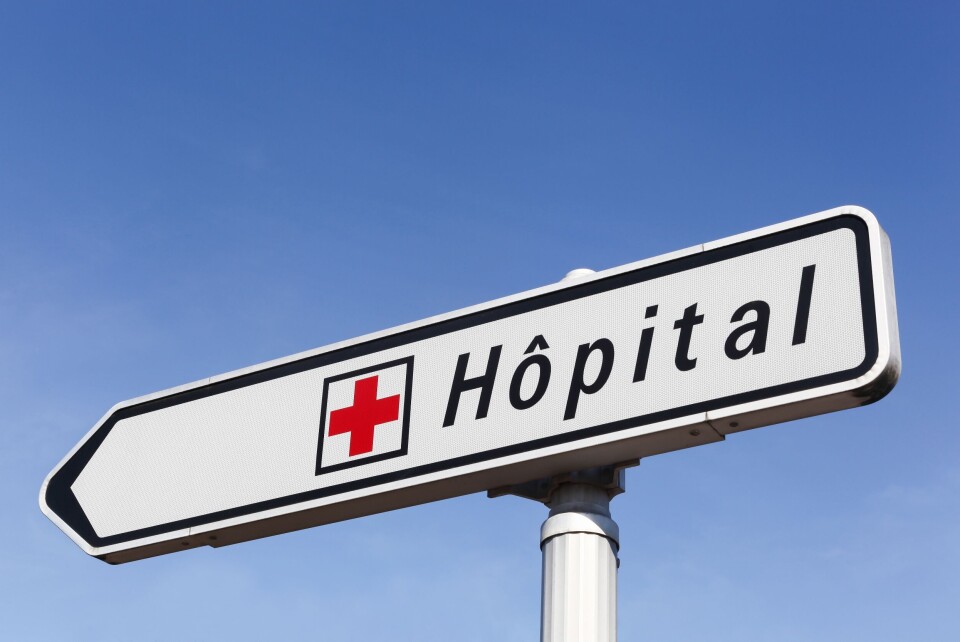-
People are living longer in better health in France, official new data shows
The expected healthspan of people in France has increased by almost two years since 2008
-
Strike at Crédit Agricole sees many branches closed
Unions are asking for the reopening of salary negotiations
-
New French 2026 budget plan – key points for residents
Higher public spending and increased tax on businesses included as overtures to Socialist Party
Non-emergency patients saturating French hospital ‘urgences’
However creating a system to effectively filter people out without risk is complicated

Around 20% of people who go to accident and emergency departments in France do not need to be there and are causing a ‘crisis’ level of tension as a result, figures show.
The Cour des Comptes, France’s public spending body, estimates that one in five people who show up at emergency centres are not actually ‘emergency’ patients and that the excess visits cost the country €3.2billion per year.
And, despite triage filters being in place at entrances, it can be difficult to ascertain whether someone should be turned away on arrival. This is adding further tension to already strained units, experts are warning.
At least 120 emergency service departments in France are facing major difficulties with the oversaturation of patients, said the union SAMU-Urgences de France in May. Some are even being forced to close at night or at weekends due to a lack of staff.
Read more: ‘Dangerous conditions’ in 127 hospitals and emergency units in France
However, it is very difficult to determine exactly which patients should be turned away without risk, reports on the subject find.
It comes as the latest hospital data (from around 629 establishments across France with emergency services) also shows that the number of people attending emergency units has exploded in recent years from around 10 million per year in 1996 to 21 million in 2019.
Read more: French hospital workers strike over 'disastrous' staff shortages
This is despite the number of patients with severe problems increasing only a little, if that. A 2015 report into the issue from Dr Jean-Yves Grall found that “serious cases” represent 10% of admissions, of which half are genuine life-or-death emergencies.
In its annual report in 2019, the Cour des Comptes said that “measuring and analysing avoidable visits” was a “major challenge”, and it was worried to see that emergency services are “still being called on too often”.
Rather than visit emergency services, around 10-20% of people admitted could have been treated at a general medical practice instead. This figure is based on the results of the clinical classification of emergency patient forms (CCMU), which are filled in by the emergency doctor after the patient has been seen.
Taking into account a few exceptions, and people who are stable but who could benefit from extra examinations, the data suggests that "approximately 20% of current emergency patients should not be visiting these establishments”, the report said.
Lack of alternatives?
Louis Soulat, vice president of the SAMU-Urgences de France union, said that redirecting people away from emergency services “depends on us being able to offer them an alternative”.
He said that in places with ‘medical deserts’ and a lack of GP services, this is not always possible.
Read more: Eight facts to understand France’s issue of ‘medical deserts’
Some hospitals are already doing this. In Rennes, the head of the CHU said: “For the past two years we have been experimenting with a system whereby a nurse at the door enables us to send 10% of people to GP surgeries in town.”
In Toulouse, 30-40% of patients are examined and classed as those who only need a simple consultation and no further emergency care.
Head of the adult emergency service, Sandrine Charpentier, said: “These people don’t come for nothing. They come because they can't find an answer elsewhere. Very few come just to 'consume care'.”
The head of emergency at the Delafontaine Hospital in Saint-Denis (Seine-Saint-Denis) said that an advantage of the emergency department is that elderly people or those with psychiatric issues can access medical care faster than through other channels.
In a report, he wrote: "Coming to the emergency room, even if there is a wait, means accessing medicine, all medicine, without an appointment or consultation.
It means having access to examinations, radiology, scans, and analyses without advance payment and without having to go through private practices.”
Low awareness of alternatives
However, a study conducted by the CHU in Nantes found that many of the patients who attended “standing” (meaning they are considered to be less serious) had made no attempt to find care before coming to the emergency department.
They had neither called the emergency services (such as on 15 or 112), nor their GP, nor sought out other services such as SOS Médecins. Author of the study, Nicolas Godiveaux, said: “We are seeing a very low awareness of the alternatives.”
Related articles
How to save medical info for French emergency services to use on phone
Making 112 the only emergency number in France would be ‘an error’
Hospital staff in France called to protest over worker shortages
























